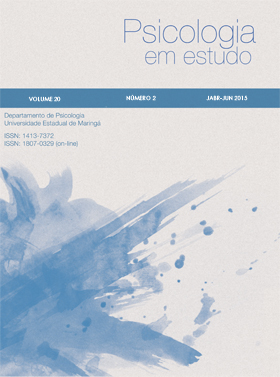CONSIDERACIONES PSICOANALÍTICAS SOBRE DIFICULTADES DE LA METODOLOGÍA EN LAS CIENCIAS QUE LIDIAN CON SUJETOS
Resumen
Este texto parte de la constatación, en la historia de las ciencias y en la filosofía, de la precariedad de nuestras herramientas sensoriales y cognitivas en la aprehensión de la esencia de los objetos, y la consecuente importancia de estudiar, cuidadosamente, la forma en que se intenta esta aprehensión. Utilizando conceptos psicoanalíticos, trabaja las dificultades y la ilusión que sostienen las discusiones metodológicas, y las repercusiones de esas discusiones, principalmente en el campo de las ciencias que lidian con la subjetividad, ya sea ésta referente a un único individuo, ya sea a una colectividad. Inicialmente abordando el psicoanálisis, propone que el método de ésta corresponde a la transferencia, lo que realza la ambigüedad del método, una vez que ésta tanto es aquello que viabiliza el proceso, como también lo que se presenta como su mayor obstáculo. La resistencia, en este sentido, tanto del analista, cuando del analizado, sería la señal más evidente de la peculiaridad de encarcelamiento que el método representa para la emergencia del sujeto, que es el objetivo principal del proceso. Se sugiere, así, que esa discusión pueda ser extrapolada para las ciencias humanas en general, donde dificultades similares podrían ser encontradas. Al final, en consonancia con el antropólogo Viveiros de Castro, propone una metodología que se procese en movimiento, en transformación, donde la esencia de aquello que se busca se encuentra en la novedad que lleva a estremecer el método utilizado.Descargas
Citas
BADIOU, A. (2006). Logiques des mondes. Paris: Seuil.
CASTRO, E. V. (2012). “Transformação” na antropologia, transformação da “antropologia”. Mana, 18(1), 151-71. Recuperado em 30 de maio, de 2016, de: http://dx.doi.org/10.1590/S0104-93132012000100006
CURZ, J. A. (2012). Considerações sobre o(s) tempo(s) na direção da análise: um percurso na clínica psicanalítica em Freud e Lacan. Dissertação de mestrado Não-Publicada, Centro de Filosofia e Ciências Humanas, Universidade Federal de Santa Catarina, Florianópolis. Recuperado em 30 de maio, de 2016, de: https://repositorio.ufsc.br/bitstream/handle/123456789/103432/316855.pdf?sequence=1&isAllowed=y
DAVID-MÉNARD, M. (2015). Método psicanálitico e vida pulsional (Trad. B. Chnaiderman). Lacuna: uma revista de psicanálise, 0, não paginado. Recuperado em 30 de maio, de 2016, de: https://revistalacuna.com/2015/09/29/metodo-psicanalitico-e-vida-pulsional/
DESCARTES, R. (2007). Regras para a orientação do espírito (2a ed.). (M. E. Galvão, Trad.). São Paulo: Martins Fontes. (Original publicado em 1628-29).
LACAN, J. (1971/2003). Lituraterra. In Outros escritos (pp. 15-25). Rio de Janeiro: Jorge Zahar
LAVENDHOMME, R. (2001). Lieux du sujet : psychanalyse et mathématique. Paris: Seuil.
ZIZEK, S. (2011, 23 de março). L’inconscient, c’est la politique. Conferência realizada na University of Leeds, Leeds, Reino Unido. Recuperado em 30 de maio, de 2016, de: http://colblog.blog.lemonde.fr/2011/09/01/slavoj-zizek-linconscient-cest-la-politique/#more-1354
ZIZEK, S. (2016, 03 de fevereiro). A necessidade de atravessar a fantasia (D. A. Teixeira, Trad.). Lavrapalavra, não paginado. Recuperado em 30 de maio, de 2016, de: https://lavrapalavra.com/2016/02/03/a-necessidade-de-atravessar-a-fantasia/
SANTOS, M. (2000). O papel ativo da geografia um manifesto. Revista Território, V(9), 103-09. Recuperado em 30 de maio, de 2016, de: http://www.revistaterritorio.com.br/pdf/09_7_santos.pdf
As opiniões emitidas, são de exclusiva responsabilidade do(s) autor(es). Ao submeterem o manuscrito ao Conselho Editorial de Psicologia em Estudo, o(s) autor(es) assume(m) a responsabilidade de não ter previamente publicado ou submetido o mesmo manuscrito por outro periódico. Em caso de autoria múltipla, o manuscrito deve vir acompanhado de autorização assinada por todos os autores. Artigos aceitos para publicação passam a ser propriedade da revista, podendo ser remixados e reaproveitados conforme prevê a licença Creative Commons CC-BY.
The opinions expressed are the sole responsibility of the author (s). When submitting the manuscript to the Editorial Board of Study Psychology, the author (s) assumes responsibility for not having previously published or submitted the same manuscript by another journal. In case of multiple authorship, the manuscript must be accompanied by an authorization signed by all authors. Articles accepted for publication become the property of the journal, and can be remixed and reused as provided for in theby a license Creative Commons CC-BY.
















